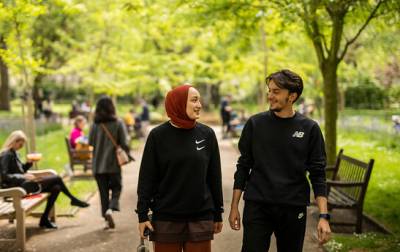Looking after your physical and mental health

It is very important for you to register with a GP (general practitioner) while you are studying at UCL so that you can get medical care if you need it. This is for your physical health and your mental health. The NHS provide a helpful search tool, which will allow you to find a GP surgery near you. Simply use your postcode to see the closest options.
If you are studying at UCL for less than six months you will have limited access to NHS services and you will need to obtain private medical insurances as you will likely be liable for any services you use. More information can be found on our Accessing Healthcare page.
Mental health, well-being and disability support
UCL Student Support and Wellbeing provides a range of mental health, wellbeing and disability support for all students. This includes same-day appointments (Monday-Friday), allowing students to receive advice quickly and easily, as well as pre-booked longer appointments if you would like more time to speak to an advisor. They offer wellbeing advice and signposting, counselling, help putting reasonable adjustments in place and much more.
Students with a disability, long-term health condition or Specific Learning Difficulty such as dyslexia or dyspraxia are encouraged to let Student Support and Wellbeing know about this before starting at UCL, to ensure the correct support is in place when you arrive.
For more information, please visit our Student Support and Wellbeing page or contact us by email at student.wellbeing@ucl.ac.uk.
Global Student Assistance Programme
The Global Student Assistance Programme is designed to help all of our Study Abroad students complete their time abroad successfully and allow them to meet their responsibilities both professionally and personally. You can obtain practical information, resources and sign-posting to other services, as well as short-term counselling on a variety of topics. Information can be provided over the phone, via email, or by post. Short-term phone counselling. For more information, please visit the Global Student Assistance Programme page.
Staying in touch

This may sound simple, but keeping in touch, whether it be by call, text, video chat or social media, can help remind you that the care that you have for each other has not been lost with the distance. Let them know that you'll always get back to them when it's possible.
You could even plan a certain day and time each aside time to talk to one another and catch up on the happenings of the week. creating a routine like this can help to create a sense of structure.
Advice on day-to-day matters
Each subject area has an Affiliate Tutor, who is available to provide practical, personal and academic guidance. The Affiliate Tutor is your main point of contact for academic support and queries relating to your programme of study.
The Student Enquiries Centre offers advice on a range of issues, including your student status and life at UCL. The centre can also sign and stamp your arrival forms.
Students' Union UCL runs an Advice Service staffed by professional advisers, and a JobShop to support students seeking part-time employment while they study (although this type of work may be subject to visa restrictions so do make sure you check if you intend to work while you're in the UK). For more information please visit the Students' Union UCL page.
Careers advice
UCL Careers is available to advise on all aspects of career planning and finding employment. UCL Careers runs an extensive range of employer-led events, including skills development workshops, presentations, forums and careers fairs. Visit UCL Careers for more information.
 Close
Close

